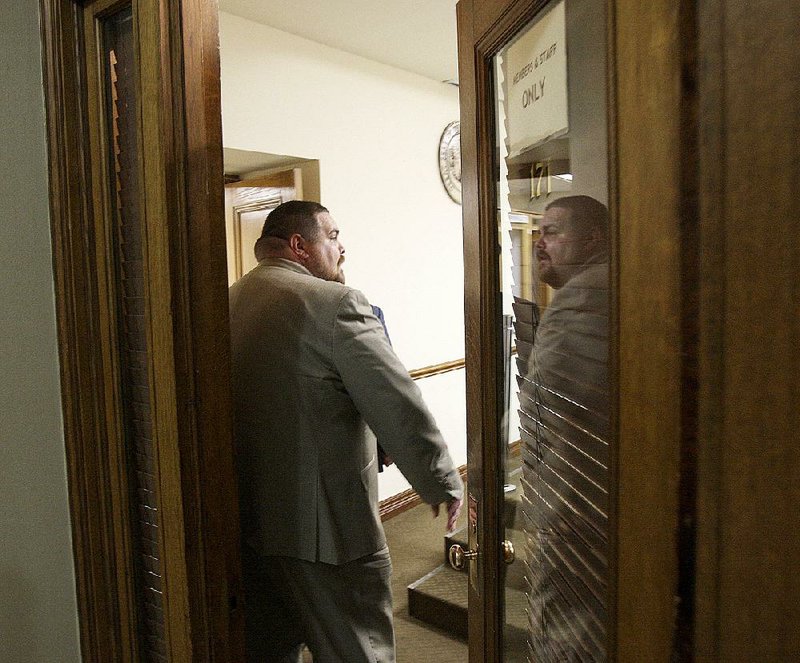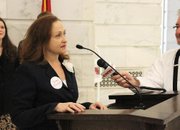Elected officials celebrated and business leaders expressed relief after a compromise Religious Freedom Restoration Act sailed through the Arkansas Legislature. But critics say they fear that the new law, though shorter, will still lead to discrimination against gays and other groups on religious grounds.
Document set
Religious Freedom Restoration Act
On Thursday, Gov. Asa Hutchinson, joined by a bipartisan cadre of legislators who helped craft Senate Bill 975, signed into law a legal defense against government laws, ordinances, regulations or policies that run afoul of people’s religious beliefs.
But Rita Sklar, the head of the Arkansas chapter of the American Civil Liberties Union, as well as other opponents of SB975 and its forerunner House Bill 1228 think that the state was better off without the new law.
“There are protections for religious liberty. I’m not saying it doesn’t need protections, but we [can already] use current law and stronger law,” Sklar said. “This law gives a person ammunition to say even though this person is [protected by civil-rights laws], I’m going to counterbalance that against my religious beliefs. And my religious beliefs say that I don’t need to serve a Muslim person [for example] … it gives you an argument in court.”
Others were more supportive of the measure. A top Acxiom official argued that lawmakers and Hutchinson had taken “positive steps for Arkansas to move our state beyond a perception that we might tolerate discrimination.” In a statement, Jerry Jones, the company’s chief ethics and legal officer and executive vice president, said “our elected leaders are helping to set the stage for Arkansas to be known as a state that embraces and benefits from diversity of thought, of political views and of tolerance of our fellow human beings.”
PLENTY OF PRECEDENT
People are still studying the new law, trying to determine what it will mean for Arkansas.
But there are more than 20 years of precedent at the federal level, and supporters stressed that the new state statute echoes federal law that already exists.
After initially signaling his support for HB1228, by Rep. Bob Ballinger, R-Hindsville, Hutchinson said Wednesday that he thought the bill was overly broad and that he wanted a Religious Freedom Restoration Act that was more in line with the federal standard.
“The fundamental purpose of this bill [SB975] means we’ll protect religion at a heightened scrutiny. We’re going to allow a person to believe what they want to believe without the state coming in to burden that without having a good reason,” Ballinger said Friday. “This bill provides those religious protections.”
The federal Religious Freedom Restoration Act (RFRA) was signed into law by President Bill Clinton in 1993 and had bipartisan support. Twenty states other than Arkansas have adopted their own versions of the law.
In short, the new law is intended to “provide a claim or defense to persons whose religious exercise is substantially burdened by government.”
Since Thursday, state law now says that a government “shall not substantially burden a person’s exercise of religion” unless it has a “compelling governmental interest” and is doing so in the “least restrictive” way possible.
Unlike HB1228, the new law can be used only in cases involving state or local governmental entities, which was what Hutchinson wanted.
COMMON LANGUAGE
John DiPippa, the dean emeritus and distinguished professor at the University of Arkansas at Little Rock William H. Bowen School of Law, described the new law as a “good first step.”
“By incorporating the federal RFRA [language], you’ve accomplished a number of things, not least of which, [giving] language other courts have dealt with, that at least there is a common language that this state and other states can speak in regarding religious liberty,” DiPippa told lawmakers Thursday. “I wish, however, that the bill had included a more express statement that it cannot be used to defeat a claim under civil-rights law.”
Much of the opposition to the state’s earlier version of the legislation stemmed from concerns that the gay community — which is not covered by civil-rights protections as other groups are — remains exposed to discrimination and has no legal recourse against it.
Some Democrats voted against SB975 Thursday because it didn’t contain a nondiscrimination clause.
Sklar and others said that by adding Religious Freedom Restoration Act language to state law, even the protections for blacks, women and Italian-Americans, for example, could be put in question because there is no language in SB975 acknowledging their civil rights.
“[The new law] injects uncertainty,” Sklar said.
“By singling [religion] out and giving it special priority [over existing First Amendment protections], it’s just not clear what it does and how it does it.”
On Friday, the Human Rights Campaign, which was a key group in organized protests and outreach campaigns by activists fighting the Religious Freedom Restoration Acts last week, issued a statement:
“Though legislators recalled the discriminatory HB 1228 and eventually passed into law SB 975, [lesbian, gay, bisexual and transgender] Arkansans still lack critical protections,” the statement said. “The legislation that Governor Asa Hutchinson signed can still be used as a weapon to discriminate against LGBT people, people of color, minority faiths, women and other Arkansans at risk.”
NATION EVOLVING
DiPippa, the law professor, once was a supporter of Religious Freedom Restoration Act laws and even testified in favor of a similar state law several years ago.
He has said that his views on the laws and how they are applied have evolved along with a nation where gay rights have come more and more to the forefront of the national discussion.
Officials from the Arkansas Municipal League and the Association of Arkansas Counties were among the fiercest critics of HB1228, arguing that it created so many legal uncertainties that towns and counties could be flooded with frivolous litigation.
On Friday, the municipal league declined to comment on the new law. Messages left with leaders in the Association of Arkansas Counties were not returned Friday.
Many business leaders, including officials from Wal-Mart Stores Inc. and Little Rock-based Acxiom, asked that Hutchinson veto HB1228 because of the negative attention it drew to the state and its implications for the business community.
On Friday, the head of the Little Rock Convention and Visitors Bureau, Gretchen Hall, said she hoped that the new law will not have any “adverse impact” on the state’s second-largest industry — tourism.
One group that she declined to name in an interview Friday had threatened to rule out Little Rock as a potential site for its next convention. With the passage of SB975, however, as far as she knows, the city remains in the running, Hall said.
But Janine Parry, a political science professor at the University of Arkansas at Fayetteville, said it may be too late for the state’s image to come away unscathed after last week’s disputes. Anytime the state appears to sanction discrimination, it can serve as a reminder of the 1957 desegregation crisis at Central High School in Little Rock, she said.
“For Arkansas as a state, my fear is once again it goes down again as balking at social change that the rest of the country knows is coming and the rest of the country has already embraced,” she said. “That’s why Wal-Mart and Acxiom acted quickly. It was another ‘There goes Arkansas’ moment.”




